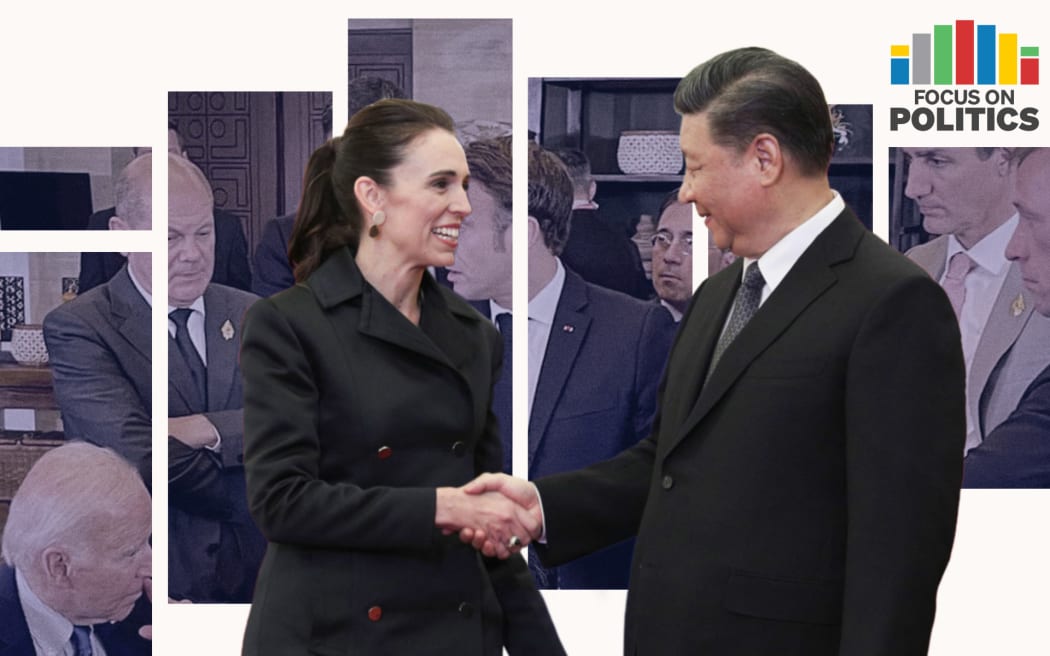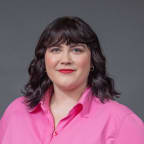"Worst-case scenario, the conflict spreads over the borders - then it becomes uncontrollable" - Al Gillespie
Prime Minister Jacinda Ardern returned to the international stage this week, even as the war in Ukraine threatened to spill beyond its borders.
The ASEAN, G20 and APEC summits offered chances for conversations with several world leaders, driving home the value of diplomacy.

Photo: AFP / Composite image RNZ
News of a rocket blast in Poland that killed two people broke early on Wednesday morning New Zealand time. Its origins unknown, the possibility of a Russian attack sent authorities scrambling.
Poland called an urgent meeting of its national security council and NATO allies began immediate investigations, while world leaders at the G20 talks in Bali convened an emergency meeting led by Biden.
The stakes were immense: Poland is a member of NATO and could invoke Article 5 of the military alliance's charter which states an armed attack against one "shall be considered an attack against them all" and could prompt use of force. However, as Waikato University law professor Al Gillespie told Checkpoint, all 30 members would need to reach consensus for that to happen.
Read more:
- NATO, Poland say missile was Ukrainian
- Ardern hopes to drive regional consensus at Asian summits
- PM Jacinda Ardern in Vietnam: Top-level meetings and ceremony
- Miller: Ardern's Asia trip rekindles independent foreign policy
- PM in Vietnam focuses on trade, food production
- Myanmar govt's executions 'a stain on region' - Jacinda Ardern
New Zealand had just days before confirmed it was continuing deployments in support of Ukraine through to mid-2023.
Ardern - in Vietnam to rejuvenate New Zealand's trade with the $2 billion export market including limes and pomelos - had been anticipating heightened geopolitical tensions during her trip - but not to this extent.
She urged caution, "but also to continue to call for all leaders to do what we can to ensure that ultimately the war ends".
As more details emerged about the Poland strike, Biden told waiting media it was unlikely a Russian attack and NATO chief Jens Stoltenberg later said it was probably a Ukrainian air defence missile - fired to intercept a Russian attack in Ukraine.
Ardern had earlier been in Cambodia for the ASEAN East Asia summit, where she had a near miss with Covid-19 and a quiet 15-minute chat with Biden on the sidelines, following up on their conversation from May.
Biden had come into the busy week of international meetings having just retained majority control of the Senate in the US midterms. It was the best performance for a sitting party in 20 years - so he was coming from a position of domestic power when he met with China's President Xi Jinping - but he wasn't the only one, Xi having secured a third term as leader of the Chinese Communist Party in October.
The pair met in Bali for three hours ahead of the G20, and emerged promising cooperation and emphasising common ground. Xi also spoke to Australia's Prime Minister Anthony Albanese, a meeting widely regarded as a breakthrough after relations had soured over escalating trade tensions.
Xi's exchange with Canada's Prime Minister Justin Trudeau was not so smooth, the pair publicly sparring over supposedly leaked details of their closed-doors meeting, China's leader was suspected to be unhappy about reports Trudeau had raised concerns about Chinese "interference" in Canadian elections, and espionage.
New Zealand's small size excludes it from the G20 talks, but Ardern's trip to Asia is bookended with the economy-focused APEC, including bilateral talks with Indonesia and the Philippines and chats with US vice president Kamala Harris and Trudeau.
But her own long-awaited meeting with Xi on Friday night is the centrepiece. The threat of a clash of superpowers - military or even nuclear - may have subsided, but the Ukraine conflict remains a central topic of conversation.
Ardern also promised media she would not shy away from raising more sensitive subjects with our biggest trading partner like the oppression of Uyghur Muslims in Xinjiang and China's increasing presence in the South Pacific - so the jury is out on the tone and outcome of their conclave.
It again proves, among the other events of this week, the value of prime ministerial travel abroad and the importance of relationship building.
In today's Focus on Politics podcast, RNZ Political Reporter Katie Scotcher appraises the interplay between world leaders in a week of summits and uncertainty.
Listen free to Focus on Politics on Apple Podcasts, on Spotify, on iHeart Radio or wherever you get your podcasts.


